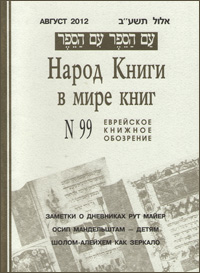The People of the Book in the World of Books is a Russian bimonthly publication for serious readers with Jewish interests. Our English website includes only the summaries of the published articles. To access the complete text of them, please visit the Russian version of this website.

|
||
|
This issue of the magazine includes:
• Review: Some Thoughts about Ruth Maier’s Diary
In early 1939, Ruth Maier, a young Jewish woman from Nazi-occupied Vienna, was able to find refuge in Norway. She rather quickly became fluent in Norwegian and befriended Gunvor Hofmo, the future celebrated modernist poet. But a year later, Norway was itself conquered by the Nazis, and Maier was arrested and deported from the country. Arriving in Auschwitz in November 1942, she was led straight to the gas chambers. She lived to be twenty-two. Her diary was found among Gunvor Hofmo’s papers after the poet’s death and first published in Norwegian in 2007. Two years later, the English translation appeared, and it was published in Russian in 2011. In the diary, written between 1933 and 1942, Maier describes the deteriorating conditions for Austria’s Jewish population following the 1938 Anschluss and her reaction to the many changes in her life. The reviewer emphasizes that the gradually emerging media cliché of Ruth Maier as “Norway’s Anne Frank” has been useful for promoting the book and presenting it to wider audiences but significantly narrows the range of problems it touches on. In her diary, Maier raises universal questions and demonstrates an understanding, striking for her age, of the historical processes that radically changed the face of Europe in the 1930s.
• Synopses: Osip Mandelstam’s Children’s Poetry
In the mid 1920s, Osip Mandelstam turned to writing children’s verses and even published four slim books for children. In 2012, two publishing houses, one in Moscow and one in St. Petersburg, published collections of these poems. These two new editions are the starting point for this brief philosophical essay, which interprets the “children’s” component in the poet’s legacy as the “silent” Mandelstam and, simultaneously, a Mandelstam whose new sense of hearing is thus audible.
• Looking Through Russian Literary Magazines: Novels and Articles of Jewish Interest
• Jewish Calendar of Significant Dates: September–October 2012
• Bibliography: 100 New Books |


